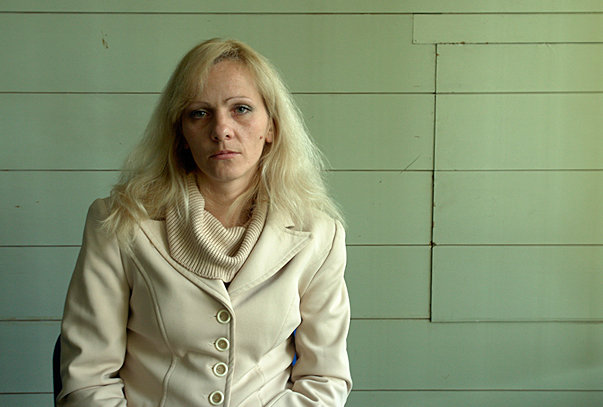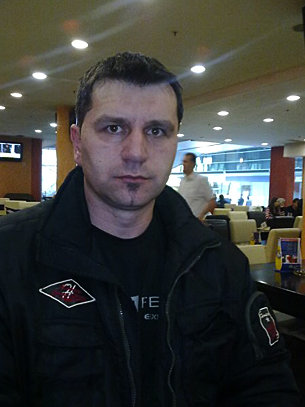In February 1992, 17-year-old Mirsad Geko played his last hockey game in the brightly-lit Zetra Olympic Hall in Sarajevo. In May that year, the war in Bosnia started and Geko gave up his dream of becoming hockey player.
In early May, he set aside his hockey stick and joined the Bosnian government army.
Only a few months later, Zetra – once a symbol of the 1984 Sarajevo Winter Olympics – had been reduced to a battered skeleton by fire and bombardment from Serb military positions around the besieged city.
Geko was too young to be conscripted into the army, but he joined up as a volunteer. He went on to become a member of a special police unit that formed part of the armed forces of Bosnia and Hercegovina, BiH.
“When I think of it now, I believe that’s how it was meant to be. I think it was worth it,” he said.
Although he claims he has no regrets about joining up at such a young age, Geko admits that it was not the best way for a young man to spend his teenage years.
“I was in the trenches and disarming landmines when somewhere else in the world, young people my age were going to school, having fun and flirting with girls. I didn’t have a school graduation party so I’ll never know what it would have been like,” he said.
Somewhat surprisingly, Geko refers to his years in the army as “the best period of my life, the period when I felt truly alive”.
Geko was one of several thousand child soldiers who voluntarily joined military and police units on all three warring sides in the 1992-95 war in Bosnia. Two decades since the conflict started, the exact number of children who fought in it remains unknown.
Associations of former child soldiers from the former Yugoslavia estimate that around 10,000 people under the age of 18 – some even as young as ten – participated in the Balkan wars of the 1990s.
The laws in force in the former Yugoslav states at the time did not allow anyone under the age of 18 to be mobilised in the event of armed conflict. However, there was no explicit law prohibiting minors from joining up voluntarily.
The Convention on the Rights of the Child adopted by the United Nations in 1989 defines anyone under 18 as a child, but sets a lower limit of 15 for volunteering for armed combat. An optional protocol adopted in 2002 – years after the Bosnian war – required signatory states to prevent under-18s, too, from joining armed forces and taking part in conflict.
The United Nations children’s agency UNICEF defines a child soldier as anyone under 18 who is part of a regular or irregular armed force of any kind. The definition encompasses not those employed in combat roles, but also cooks, porters, messengers and spies.
There are no official figures for how many people under the age of 18 fought in BiH, or their age and sex distribution. But according to the Research and Documentation Centre, IDC, a Sarajevo-based NGO that gathers data on human losses during the Bosnian war – 661 child soldiers aged between ten and 18 were killed in the conflict.
INTERRUPTED CHILDHOODS
UNICEF estimates that around 250,000 child soldiers, some as young as eight, are currently involved in over 20 armed conflicts around the world. The British organisation War Child, says most underage soldiers are in Africa, and that 40 per cent of the 250,000 total are girls.
It was not unusual for girls and young women to take an active part in the Bosnian conflict.
Ramiza Variz from Sarajevo was younger than 16 when she and her older sister joined the BiH government army. She spent four years in the force, and was deployed to numerous front-line areas. She still bears a scar from a wound she suffered in 1993.

“I don’t regret joining the army,” she said. “I only regret that I didn’t have a normal childhood.”
Variz is now chair of the Association of Underage Soldiers of the BiH Federation.
She joined the military, she says, because she feared for her own life and for her family members.
Similar concerns prompted Nenad Bukvic to join the opposing Bosnian Serb army, VRS, in 1992.
“I felt really important. I had a uniform and a rifle, although I was only 17,” said Bukvic. “I thought: ‘They are attacking us, so we’ve got to defend ourselves’,” he added.
Today, Bukvic is disabled as a result of wounds he suffered during the war.
Asked whether he would do the same again, he said he would, but he added that he would never allow his son to go through the horrors of war he experienced.
“I don’t have another homeland, and if I were forced to defend myself again, I would do that. But I wouldn’t allow my child to do what I did. I wouldn’t want any child in the world to experience what I did during the war,” Bukvic said.
ENDURING TRAUMA, NEGLECT
An Amnesty International report on children in armed forces around the world published in February notes that as well as missing out on childhood and schooling, child soldiers are exposed to dangers that will cause physical and mental trauma.
Nedzad Hodzic, from the central town of Travnik was only 15 when he joined the Bosnian government army in 1992. In August that year, he was badly wounded.

“I was very young – too young – when all that happened; the war and my injury. That’s something no one should go through, least of all a child,” he said.
Hodzic’s memories will always be overshadowed by the day his was shot.
“When I joined the army, I was assigned to delivering food to the trenches by horse. On August 12, on my way up to the trenches, a sniper shot me in the head. I spent seven or eight days in a coma. That wasn’t the only trauma I suffered in the war, but it was certainly the biggest,” he said.
Branko Matosin, who heads the association of Bosnian Croats who served as young volunteers, says life is tough for most of the former child soldiers from the war. Most are unemployed, and they get little outside help in trying to come to terms with their experiences.
“Many members of our association are in various healthcare institutions, mostly psychiatric, and no one wants to help them,” said Matosin, who was himself a child soldier with Bosnian Croat forces. “Society not only downplays our involvement in the Bosnian war, but it persistently neglects us, as if to cover up the fact that children, too, fought in the war.”
Both of BiH’s administrative entities, the Federation and Republika Srpska, have legislation covering the rights of former combatants. These laws do not make separate provision for those who were minors at the time, as they do not recognise them as a separate category. Such individuals are entitled to the same rights as other war veterans. For example, they have the right to free healthcare, orthopaedic devices for the disabled, and preferential treatment when applying for jobs and housing.
Former child soldiers say that in practice their rights are often disregarded, particularly when it comes to employment and healthcare.
Geko will soon get his master’s degree in security studies, but he says he cannot find work.
“I’m educated and yet I can’t find a job that I’m qualified for, even though I am supposed to get priority over other applicants who didn’t fight in the war,” he said. “But that’s only on paper.”
The associations that represent Bosnia’s one-time child soldiers believe changes in legislation could give them more recognition and improve their lives.
Like so many others, Kemal Salaka, who heads an association of former child soldiers in Sarajevo canton, joined up as a minor because he feared for his life. Although he does not regret doing so, he is unhappy that people like him get no formal recognition as a special category.
“The state treats us as equal to demobilised soldiers. Child soldiers who joined the army voluntarily are treated the same as conscripted soldiers. We don’t think that’s fair. This is why we want the law to recognise us as a separate category,” Salaka said.
At the moment, certain categories of war veteran – including those who were decorated in the war and those left disabled – are entitled to a monthly payment as reimbursement for the time they spent at war. Former Bosnian Serb soldiers get this payment from the government of Republika Srpska, and those who served in the Bosnian government or Croat forces receive it from the Federation authorities.
Officials at the Federation’s ministry for war veterans told IWPR it was currently impossible to make the legislative changes that former child soldiers were seeking, but they were trying to find a satisfactory solution for this category of ex-soldiers. The equivalent ministry in Republika Srpska did not respond to repeated requests for comment on the matter.
Geko says that although he is disappointed with the way Bosnian society treats former child soldiers, he would not have changed the decision he made at 17 back in 1992.
“Although society ignores us, I am still proud of every second I spent in the army. I would do the same thing again,” he said.
This article was produced as part of Tales of Transition project funded by the Norwegian Embassy in Sarajevo. SCCA/pro.ba is carrying out this project in co-operation with the IWPR and EFM Student Radio.